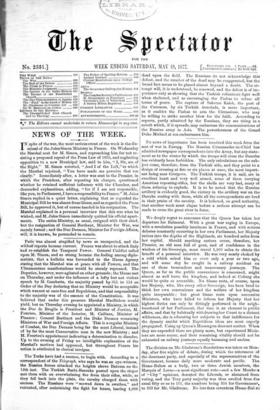The division on Mr. Gladstone's Resolutions was taken on Mon-
day, after five nights of debate, during which the utterances of the dominant party, and especially of the representatives of the Government, became daily more moderate and pacific. The Home-Rulers as a body, two or throe Jewish members, the Marquis of Lorne—a most significant vote—and a few Member of " City " opinions, desetted the Liberals, or abstained from voting, and the Tory party majority was thus swelled from the usual fifty or so to 131, the numbers being 354 for Government, to 223 for Mr. Gladstone. No less than seventeen Home-Ruh r3 voted with the Tories, making a difference on the usual vote of 34, while twenty-one more absented themselves, partly, it is stated, under direct pressure from the Catholic Episcopate, which is, like the Papacy, pro-Turkish. Mr. Roebuck voted, as usual, on the wrong side, and Mr. Forsyth, though entirely in favour of Mr. Gladstone's policy, voted against his expressed convictions. The vote has done mischief on the Continent, especially in Hungary, where it is imagined that England is on the side of the Pashas, but it is quite understood at home that it was secured by a promise of neutrality for the present. The Government is pledged up to the lips not to fight, unless "the route to India" is threatened, and the route to India was defined by the Chancellor of the Exchequer as the route through Egypt. The "independence and integrity of the Ottoman Empire" was never mentioned in the debate by any responsible speaker, and has become a purely historical phrase.



































 Previous page
Previous page